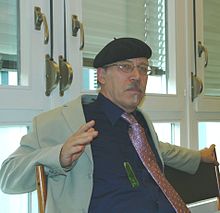Christopher Busby

Christopher Busby (born 1945) is a British scientist and activist known for his work on the health effects of ionising radiation. In addition to his academic appointments he is the director of Green Audit, an environmental consultancy agency,[1] and scientific advisor to the Low Level Radiation Campaign which he set up in 1995.[2] Busby was also the National Speaker on Science and Technology for the Green Party of England and Wales,[3][4] and the Scientific Secretary of the European Committee on Radiation Risks, based in Brussels.
Career
Busby obtained a BSc in Chemistry from the University of London, and then did research for the Wellcome Foundation (applying spectroscopic and analytical methods to chemical pharmacology and molecular drug interactions). He later gained a PhD at the University of Kent, researching Raman spectro-electrochemistry.[5]
Busby is a Visiting Professor in the Faculty of Life and Health Sciences in the University of Ulster, Northern Ireland.[6][7]
In 1999 Busby stood as an Election Candidate for the European Parliamentary elections.[8]
Radiation
From 1987 onwards Busby has worked in particular on the health effects of ionising radiation, developing the 'Second Event Theory' which distinguishes between hazards from external and internal irradiation. He has studied the effects of low-dose radiation on health.[9][10] Recent (2008) work by Busby, focusing on the photoelectric effect as a mechanism for cells to be damaged by ingested uranium, was covered by the popular New Scientist magazine.[6][11]
"As member of the International Society for Environment Epidemiology, he was invited to Iraq and Kosovo to investigate the health effects of depleted uranium. He has also given presentations on depleted uranium to the Royal Society and to the European Parliament. He was a member of the UK Ministry of Defence Oversight Board on Depleted Uranium."[5] He served on the UK Government's Committee Examining Radiation Risks of Internal Emitters (CERRIE), which operated between 2001 and 2004, ultimately disagreeing with the committee's conclusions and publishing a "minority report" with another committee member.[12]
Busby is the author of two self published books on cancer incidence in Wales, Wings of Death and Wolves of Water, and according to CERRIE "articles and research papers on low level radiation."[5] The books were criticised in papers published by the Journal of Radiological Protection, which described their analysis as erroneous in consequence of various mistakes.[13][14] According to the editor-in-chief of the journal, a fellow CERRIE committee member and representative of the nuclear industry, "much of Chris Busby’s work is self-published and difficult to access; he seems mainly to avoid publication in the recognised scientific literature, which presents difficulties for a proper review of the evidence underlying his conclusions."[12]
On 14 March 2011 Professor Busby was asked by the BBC to give his assessment of the radiation danger[15] following the earthquake and tsunami in Japan and the ensuing nuclear power plant incidents.
Publications
- Wings of Death. Nuclear Pollution and Human Health, Green Audit Books, 1995, ISBN 1-897761-03-1
- Wolves of Water, Green Audit Books, 2007, ISBN 1-897761-26-0
- Chernobyl 20 Years On. Published on Behalf of the European Committee on Radiation Risk. Editors Ch. Busby and A.V.Yablokov. Green Audit Books, 2009, 2nd edition. ISBN 1-897761-15-5
References
- ^ Green Audit
- ^ Green Audit, About Green Audit
- ^ "Greens launch radiation activist network". Green Party of England and Wales. 23 October 2004. Retrieved 26 January 2011.
{{cite web}}: Cite has empty unknown parameter:|1=(help) - ^ "Far more spin than substance". Green Party of England and Wales. 2 September 2002. Retrieved 26 January 2011.
{{cite web}}: Cite has empty unknown parameter:|1=(help) - ^ a b c CERRIE biography of Busby
- ^ a b Oliver Tickell (September 7, 2008). "How war debris could cause cancer". New Scientist.
- ^ Chris Busby (2008). "Uranium weapons: why all the fuss?" (PDF). Disarmament Forum: Uranium Weapons (3). United Nations Institute for Disarmament Research: pp. 57–58. ISSN 1020-7287.
{{cite journal}}:|pages=has extra text (help) - ^ "1999 Election candidates". UK Office of the European Parliament. Retrieved 3 April 2011.
- ^ pacifica.org radio, January 31, 2003 interview with Dr. Chris Busby, Retrieved 10-02-2008
- ^ "Scientist raises new radiation fear", news.bbc.co.uk, July 5, 2001
- ^ John E. Pattison, Richard P. Hugtenburg and Stuart Green (2010), Enhancement of Natural Background Gamma-radiation Dose around Uranium Micro-particles in the Human Body, Journal of the Royal Society Interface 7(45):603-611. DOI 10.1098/rsif.2009.0300.
- ^ a b Wakeford, Richard (2004). "Reflections on CERRIE" (PDF). Journal of Radiological Protection. 24 (4): 337–340. doi:10.1088/0952-4746/24/4/E02. PMID 15682902.
- ^ Steward, John A.; White, Ceri; Reynolds, Shelagh (2008). "Leukaemia incidence in Welsh children linked with low level radiation—making sense of some erroneous results published in the media". Journal of Radiological Protection. 28 (1): 33. doi:10.1088/0952-4746/28/1/001. PMID 18309193.
- ^ Wakeford, Richard (2008). "What to believe and what not to believe". Journal of Radiological Protection. 28 (1): 5. doi:10.1088/0952-4746/28/1/E03. PMID 18309191.
- ^ "Professor Busby gives his assessment of radiation from Fukushima nuclear reactor". BBC News. Retrieved 14 March 2011.
